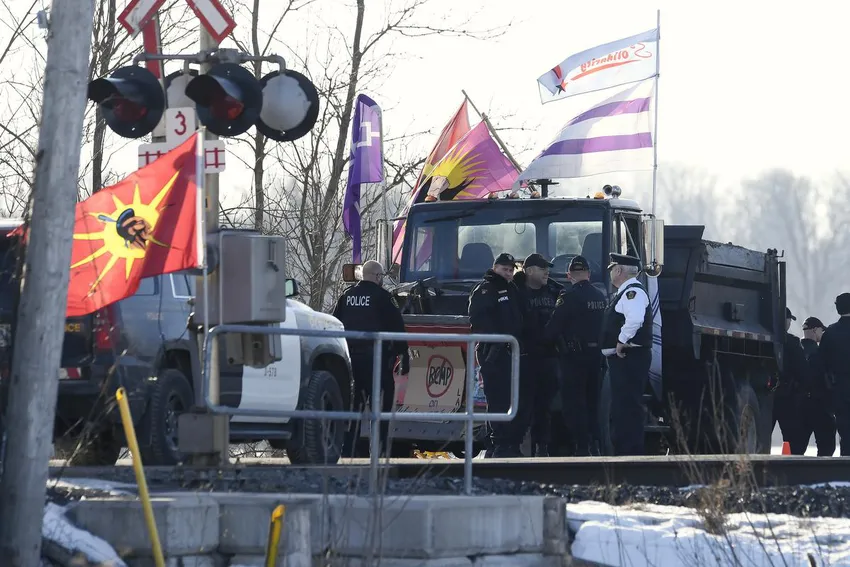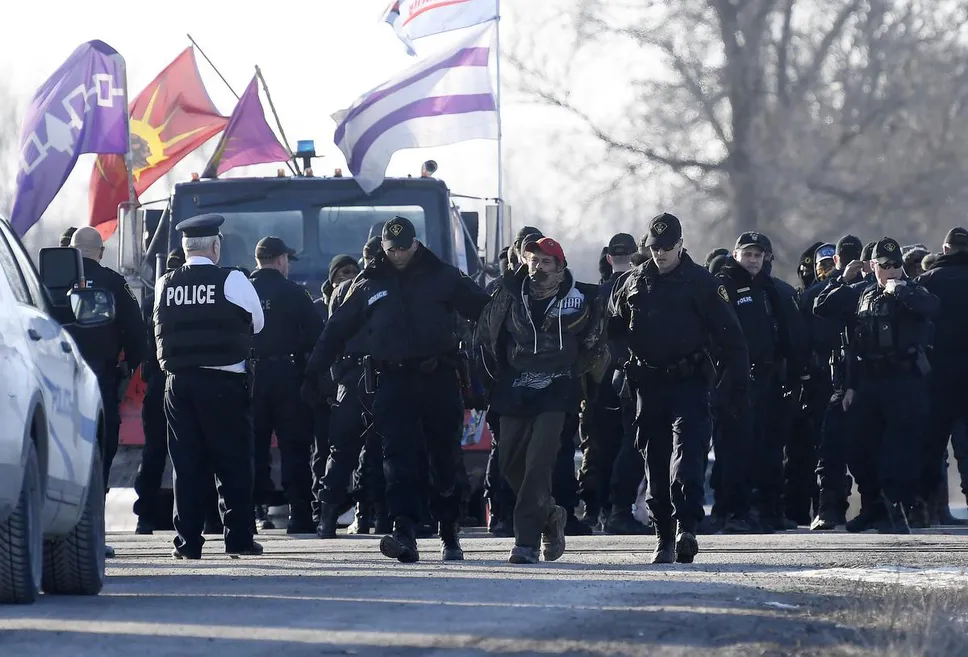The barricades were a response to a move by the RCMP to clear protesters who had been blocking access to a Coastal GasLink natural gas pipeline work site on Wet’suwet’en territory in northern British Columbia.

OTTAWA—After a dramatic day of police action against the Tyendinaga Mohawk blockade, the country appears no closer to resolving a political crisis that has halted rail transport across the nation and shaken the Liberal government’s efforts towards Indigenous reconciliation.
The focus has once again shifted west, where Wet’suwet’en hereditary chiefs were poised to meet on the continuing dispute over the Coastal GasLink pipeline. Federal ministers repeated their appeal for direct dialogue on Monday, and expressed hope that the chiefs would finally come to the table after RCMP in British Columbia agreed to reduce their presence on Wet’suwet’en traditional territory.
But outside Marysville, Ont., 10 Mohawk activists were arrested after Ontario Provincial Police decided to enforce a court injunction against the protest camp that had blocked transport along one of Canada’s key rail lines since Feb. 6, prompting Canadian National and Via Rail to temporarily lay off 1,500 workers.
The arrests were a flashpoint in the ongoing nationwide dispute. They provoked cries of disgust from protesters and fresh demonstrations of solidarity with the Wet’suwet’en hereditary chiefs who say the Coastal GasLink project cannot proceed through their territory without their consent. Even as the first train was prepped to roll through the cleared-out blockade site in Ontario, another blockade was set up on the tracks outside New Hazelton, B.C., and demonstrators blocked a road leading to the port of Vancouver.
In Ottawa, Conservative Leader Andrew Scheer accused Trudeau of being too weak to stand up against “radical activists” who refuse to acknowledge elected First Nations band councils along the pipeline route support Coastal GasLink.
“They know the prime minister will do literally nothing as the economy is brought to its knees,” Scheer said during question period.

Trudeau responded that Conservatives can’t decide which leaders speak for Indigenous nations, and defended how his government has responded to the crisis.
“We can both protect reconciliation and protect Canada’s economy as we move forward,” Trudeau said.
South of Montreal, where Mohawk activists from Kahnawake have separately blocked a Canadian Pacific rail line since Feb. 8, demonstrators flooded a major highway to slow traffic into the city Monday morning. The Mohawk Council of Kahnawake expressed “outrage and disgust” over the OPP arrests near Tyendinaga, and blamed Trudeau for his “inflammatory” remarks last Friday that efforts at dialogue had faltered and the barricades need to come down.
“We cannot state strongly enough our extreme disappointment in the absolute lack of good faith shown by a prime minister who continually expresses his government’s priority is improving its relationship with Indigenous peoples,” the council said in a statement Monday.
On Parliament Hill, hundreds of protesters gathered to express their support for Wet’suwet’en hereditary chiefs and denounce Monday’s arrests. Amidst the scent of burning sage and the thumping sound of drums, protesters marched through downtown Ottawa, shut down major thoroughfares, and staged a sit-in on the street outside Trudeau’s office.

“It really warms my heart to see people here in solidarity,” said Anna Blonqvist, a 15-year-old Dene high school student.
While the police were clearing the protest camp on Wyman Road in Tyendinaga, which included a snow plow draped in flags and signed by Wet’suwet’en hereditary chiefs during their visit last week, the OPP decided a second encampment was far enough from the tracks to not impede train traffic, spokesperson Bill Dickson said.
Meanwhile, outside the House of Commons, federal ministers were adamant they wanted to avoid police intervention to end the rail blockades that have choked off the flow of goods and passenger traffic for more than two weeks. Indigenous Services Minister Marc Miller told reporters that talks continued through the weekend, even after Trudeau called on demonstrators to stand down last Friday.
Mohawk activists stuck to their position that they would only leave the rail lines when Wet’suwe’ten hereditary chiefs were satisfied with how RCMP, who arrested 28 people blocking construction on the Coastal GasLink pipeline earlier this month, had withdrawn from their territory.
The RCMP confirmed Monday it “temporarily closed” a detachment in the disputed area Friday, and continues to patrol the region from a nearby station in Houston, B.C.
The Wet’suwet’en chiefs had already rejected that gesture as insufficient, telling reporters they will refuse to sit down with federal and B.C. ministers until the RCMP withdraw further. The chiefs also want the company building Coastal GasLink, TC Energy, to cease construction activities and leave their territory.
Miller acknowledged the RCMP withdrawal so far “was not to the satisfaction of the hereditary leadership,” but added Ottawa remains “open for dialogue, and we’re committed to a peaceful resolution.”
Crown-Indigenous Relations Minister Carolyn Bennett said there have been talks between the B.C. RCMP and the chiefs about a further “deconstruction schedule” of the disputed detachment in Wet’suwet’en territories, and she hopes further details on that will be available soon.
The ministers expected Wet’suwet’en chiefs to meet Monday to discuss next steps. But Dinize Ste ohn tsiy, a Wet’suwe’ten wing chief, told the Star he expected it to occur Tuesday.
“Nothing’s really changed actually,” he said of the RCMP presence in the disputed area. “The police aren’t standing down. They’re still very much in full force.”
How the day played out
1. The Tyendinaga Mohawk rail blockade started Feb. 6 near Belleville. The blockade was a response to calls for action from the Wet’suwet’en nation in B.C.


2. OPP moved onto the tracks to clear the blockade early Monday morning, arresting an undisclosed number of people.

3. As police took control of the site, protestors and allies continued their calls to action, organizing just south of the original blockade.

4. A second camp was growing Monday afternoon north of the rail tracks, east of the original site.


Speaking with the Star from Tyendinaga, Mohawk community member Andrew Brant condemned Monday’s arrests as a “crime against humanity,” compared police with security forces in Nazi Germany, and vowed the activists will not stand down.
“Justin Trudeau started a war. That’s the way all the Indigenous people see it across Canada and the United States and all the way to Bangladesh,” said Brant.
Around 1 p.m., a livestream posted online by the group Real Peoples Media showed demonstrators denouncing police officers who stood silently in a line near the tracks as the camp was being cleared.
“Our grandmothers’ and grandparents’ spirits are watching. Shame, shame on you!” one woman was heard saying.
Others could be heard calling police “white trash” and accusing them of “white supremacy and “genocide.”
Later Monday, demonstrators chanted ceremonial songs amid a heavy police presence, as officers blocked access to the tracks where the Mohawk activists had camped for more than two weeks. A freight train sat idle on the tracks west of where Mohawk demonstrators faced off against police, waiting to proceed as CN crews inspected the tracks and cleaned-up the area.
Standing in solidarity with the group was Mario Baptiste, a Mohawk man who attested to being a part of many protests throughout his lifetime, some of which have landed him on the wrong side of the law, including charges for unlawful assembly.
“I came out to show my support,” said Baptiste, 63, who was born and raised on the Mohawk territory. He expressed pride that a younger generation has taken up the mantle of standing up for causes impacting his community and that of the Wet’suwet’en.
Baptiste blasted Trudeau for being tone deaf to the calls from First Nations leaders and implored him to respect the rights of Indigenous peoples.
“He’s not listening,” Baptiste said next to a makeshift gate to keep reporters back. “The agreements seem to have been forgotten. According to the agreements, this is treasonous,” he said.
Protesters also occupied a second camp, near the tracks, about four kilometres east of Wyman Road. A handful of protesters milled around tents Monday evening, while two Mohawk men stood guard to block access to the camp.
Speaking to the Star Monday evening, Brant said the protesters would be staging a barbecue and “continue to sing and dance to celebrate the day. We got the world to see the colonial invaders as they did their work.”
He expected the protesters to stay through the night, even though the police had reclaimed the rail tracks.
“The police have made a human wall (blocking access to the tracks), while the Indigenous people are singing, dancing and eating,” he said.
Click Here for the original post